Tired of pulling your handcart?
In 1996, two of my kids attended the Especially For Youth Conference (EFY) sponsored by The Church of Jesus Christ of Latter-day Saints. “Living the Legacy” was the conference theme and the EFY CD (compact disc) featured Brett Raymond’s song, “You Don’t Have to Walk the Plains.” During this time, I struggled under my workload as a wife, mom to four kids, and as a student pursuing my master’s degree. Two additional factors added to my stress:
- My feminist studies professor had invited a Latter-day Saint (who had become resentful and openly hostile to the patriarchal structure of the Church) to join the class and serve as a substitute during the professor’s absence. Consequently, the communication climate within the class became an antagonistic learning environment for me.
- My university’s newspaper was publishing combative editorials about The Church of Jesus Christ of Latter-day Saints.
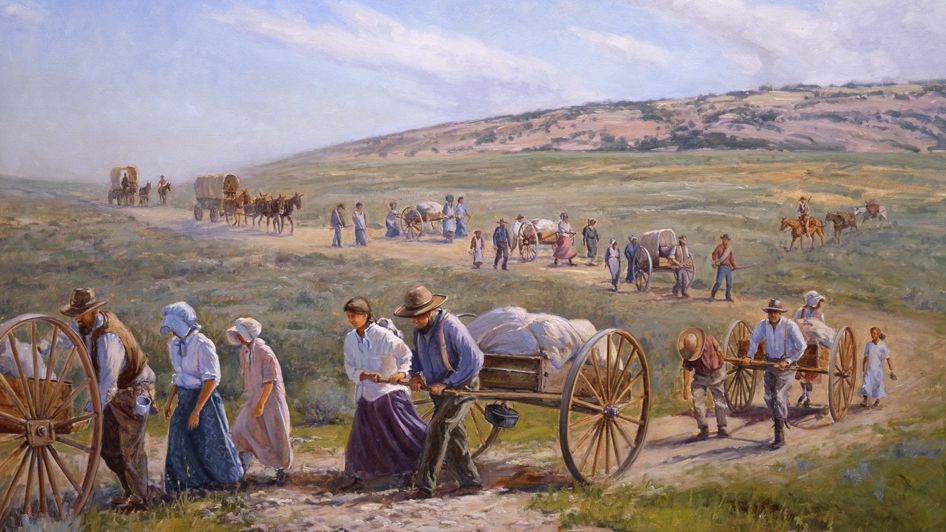
Brett Raymond’s song inspired me to identify as a modern-day pioneer. Each time I drove to my university classes, I listened to his song which increased my understanding of “fresh courage take, our God will never us forsake” (“Come, Come Ye Saints,” LDS Hymns). Below, are the lyrics to “You Don’t Have to Walk the Plains.” Listening to the song, perhaps you will also feel a kinship to the Latter-day Saint pioneers who paved the way for us:
They crossed the plains together
Their eyes set on forever
And when I think of all they did for me
How they left behind their legacy
I wonder how I’ll match their sacrifice
Then I hear a voice that says
You don’t have to walk the plains
To be a pioneer
There’s a work that still remains
So find out why you’re here
The seed is sown, the field is white
Let’s bring it to light
It seemed to grow from nothin’
A stone cut from the mountain
And if I hope to help it fill the earth
I’ll have to take my place and live the word
I’ll mark the path for those who seek
Like the way was paved for me
I don’t have to walk the plains
To be a pioneer
There’s a work that still remains
And I know that’s why I’m here
What faith began was not in vain
I’ll forge ahead and join the chain
Then pass to my posterity this legacy left for me
Don’t have to walk the plains
To be a pioneer
There’s a work that still remains
And I know that why I’m here.
We don’t have to walk the plains
To be a pioneer
There’s so much to do today
Let’s tell the world just why we’re here
Here’s a link to the song:
https://www.shazam.com/track/236712785/you-dont-have-to-walk-the-plains
Modern-day Pioneers
I have a friend who has been through hell; her husband had filed for divorce and quickly married one of his co-workers. My friend now struggles to raise their three children while sharing custody with her ex-husband and his new wife (who recently gave birth to their own child). My friend sought my counsel and prayers, so I assured her that I would pray for her. A few days later, my husband and I were visiting our children and grandchildren in Utah. Praying for my friend, I attended my son’s ward and helped my granddaughter in the nursery. As the end of the hour drew near, I felt prompted to leave the nursery and attend the last ten minutes of Relief Society. I sat in the back of the Relief Society room, and then a young mother stood up to speak. Her heart-wrenching words were riveting as she told us of her trials, comparing her sufferings to the trials and sufferings of the Latter-day Saint hand-cart pioneers.
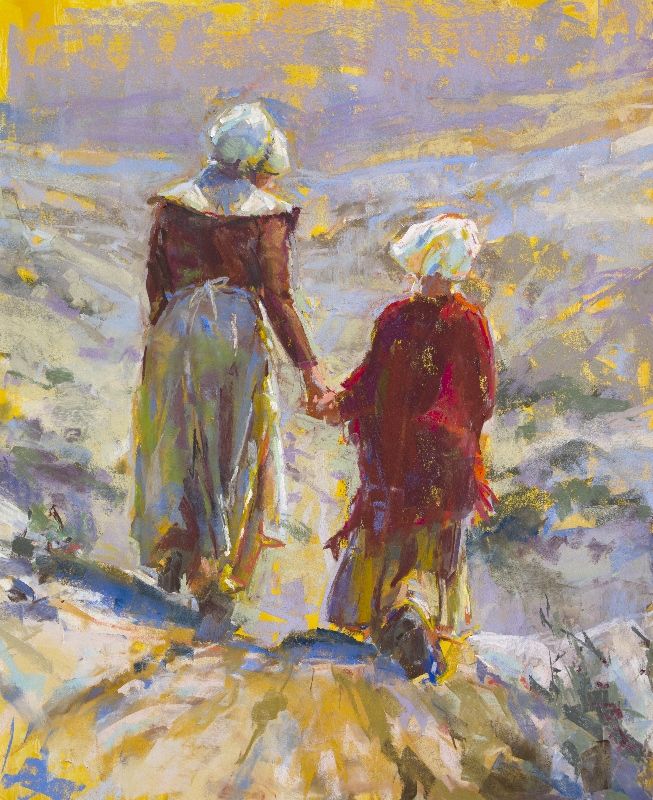
Let me pause for a moment, dear readers. Have you heard or participated in the ongoing discussion comparing the hardships of current Latter-day Saints to the sufferings of the early saints and their subsequent journey to the Utah territory? Some Church members claim that our trials cannot compare to those of the early saints and pioneers. Others disagree; they speak of the overwhelming challenges, anxiety, and heartbreak of raising children in present-day society. Personally, I still can’t decide which life circumstance would be worse: Navigating parenthood in a culture of hedonism, pornography, nihilism, narcissism, gender fluidity, drug addiction, and other mental health challenges—or—the poverty, deprivation, and persecution endured by 19th-century saints and pioneers. In the end, I don’t know that it matters. I do know, however, that like the early Saints, we need and can access the Holy Spirit’s sustenance coupled with Christ’s atoning and healing power.
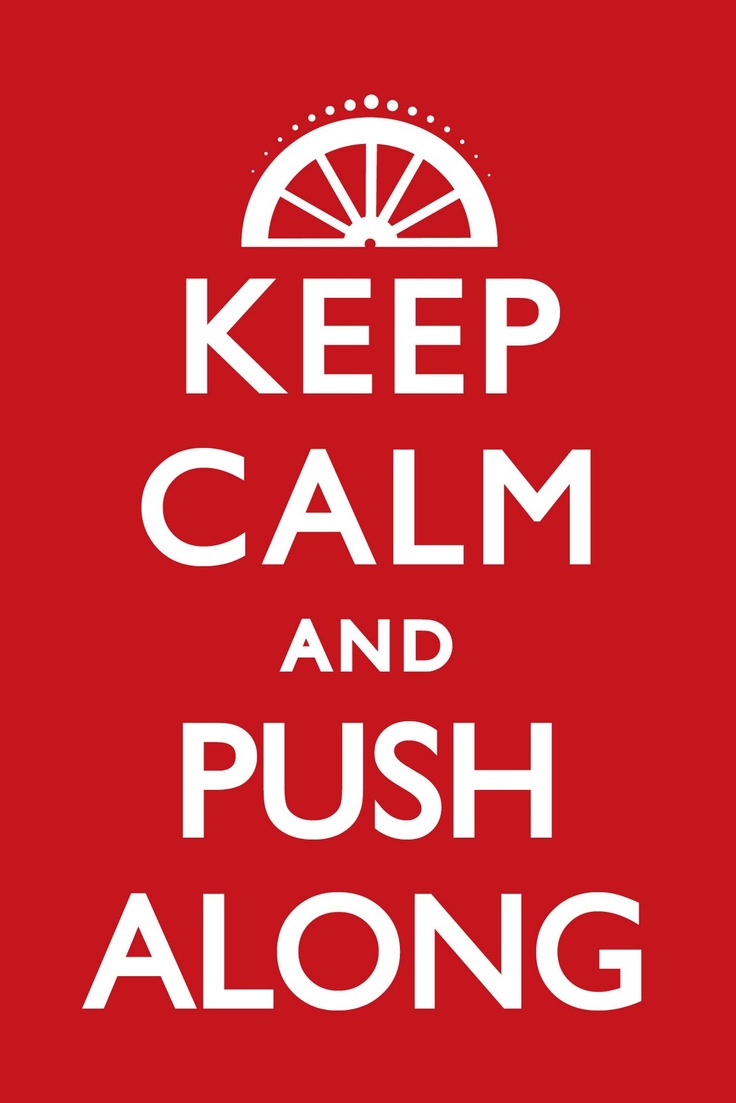
I continue with the young mother’s story: Her pre-school son had been diagnosed with an inoperable brain tumor. The doctor had taken her to “a small isolated room” to inform her of son’s prognosis: she had six months to prepare for her son’s death. The next few months were tortuous, as she took her son to agonizing chemotherapy and radiation appointments. At the same time, she mothered her three older children. Engulfed in misery and fear, she had “to re-teach and force herself to simply breathe.” Her crushing burdens had literally knocked the air out of her. Exhausted, she collapsed on her couch, imploring God to “take over.” “I can’t go any further,” she cried aloud. In that moment, she felt the Savior’s presence. She told us that, “Christ was sitting next to me on the couch and taking my burden upon Himself. He was there. He was real!” Soon after, she called her sister and proclaimed, “Christ loves me!” “Of course He does,” her sister responded. “No, He REALLY loves me. He KNOWS who I am.”
I felt the fire of her words. I felt honored to be in her presence. I marveled at her strength and her testimony of Jesus Christ.
Her child eventually stabilized. She does not know if he will live or die; the brain stem tumor remains inoperable. Yet, she’s immensely grateful for the miraculous extension of her son’s mortal life.
Another bombshell rocked her world. She discovered her husband’s double life with another woman. Recently divorced and a single mother, she still possesses the strength to bear her burdens—all because of the Savior. Her powerful, piercing words bore witness to all of us when she said:
My handcart is just as heavy as the handcarts pulled by the pioneers. Like the early pioneers who had angels pushing the back of their handcarts, I have felt Jesus Christ pushing mine. I am stronger because of Him.”
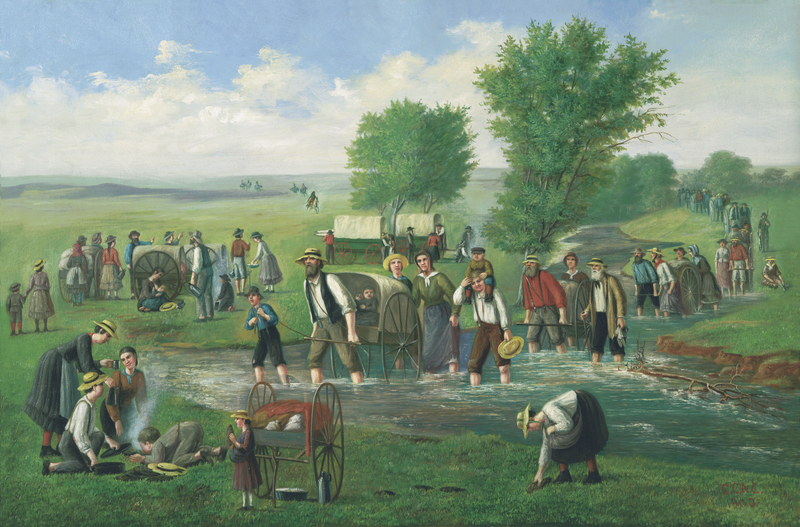
Afterward, the Relief Society president underscored this stalwart sister’s strength and testimony. Then the president recounted her own heartache. Her “handcart” had included a drug-addicted husband who was also a drug dealer. She, too, had felt the Savior’s sustaining power during those unbearable years. Her husband is now drug-free and their marriage stabilized. I was awe-struck by the spiritual power emanating from these two faithful women. And I knew I my friend would also be inspired by their stories.
What’s in your handcart? Divorce? Infidelity? Illness? A crisis of faith? A wayward child? Depression? Suffering knows no bounds. Although my personal suffering has not been as terrible, I have suffered. Similarly to the strong mother and the Relief Society president, I can testify of the Savior’s help as I pull my handcart. Not only that, Christ helps to unload the junk in my handcart, repair my handcart, clear the road for my handcart, and reassures me that I will reach my promised land.
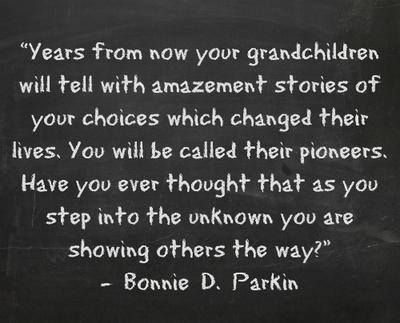
With the Savior’s assistance, all of us can pull our handcarts with spiritual strength and tenacity. We can help carry the torch of our pioneer legacy. Our family members, our children, grandchildren, and future posterity will know of our faith in Jesus Christ, and that they can also “have faith in every footstep.”
“No toil or labor fear, but with joy wend your way,”
Julie

